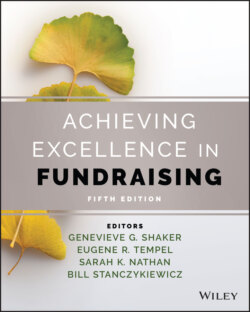Читать книгу Achieving Excellence in Fundraising - Группа авторов - Страница 28
Philanthropy in Society
ОглавлениеPhilanthropy is about certain kinds of action (giving, volunteering, advocating), the actions' outcomes and rationales. It affirms a value, a concern for the well‐being of people beyond oneself, and attention to the public good. In this context, Tempel (2003) presented the roles of philanthropy in society as:
Through healthcare, human services, and international relief, nonprofit organizations seek to reduce human suffering for those who are injured or ill, to aid victims, and to assist those not able to sustain themselves. This is perhaps the oldest role of philanthropy, a role that has existed throughout recorded history.
Nonprofit organizations enhance human potential through religion, education, the arts, culture and humanities, the environment, and international efforts.
Philanthropy promotes equity and justice through inclusive structures and programs within the public, private, and nonprofit sectors that ensure opportunity for vulnerable, marginalized, or underrepresented people. Awareness and advocacy can advance the common good wherein everyone’s human rights are assured.
Through organizations and voluntary associations, people come together; they belong, and contribute to their neighborhood, city, state, country, or world through community building.
Philanthropy provides human fulfillment by giving all people the opportunity to become that best image of ourselves. Through giving and sharing, humans express their ideas and values.
Philanthropy supports experimentation and stimulates change by taking risks, exploring areas that the larger community or the market sector may be unwilling to enter, and often funds alternative or new solutions.
Nonprofit organizations foster pluralism by allowing for multiple responses to an issue, and at its best, include a wide variety of voices. In a society in which philanthropy flourishes, parallel power structures are allowed to carry out what the government will not or cannot do.
Reflecting on these roles of philanthropy will help shape a philosophy of fundraising. Often, the first impulse in philanthropy is to make people's lives whole, by alleviating suffering and then providing enriching opportunities. For example, hospitals not only heal bodies, they also may enhance the healing process through beautiful spaces, music, and even visits from animals. Philanthropy can aid in curing disease and improving treatment through research and also in healing the spirit through artistic expression.
It is also likely that multiple roles relate to a person's philanthropic autobiography. These roles may relate to personal value systems or be the impetus of a career. Considering which roles one gravitates toward gives fundraising meaning and can influence where a fundraiser chooses to work.
Reflecting on one's philanthropic autobiography can be a reminder of teachers, mentors, religious leaders, coaches, and camp counselors who nurtured younger selves. These trusted adults were expressing philanthropy's role to enhance others' human potential. At the same time, these adults found personal fulfillment and contributed to community building through engagement with young people and causes they cared about.
Turning toward our own stories, Sarah finds satisfaction in serving as a Girl Scout troop volunteer, not only because of the activities themselves, but also because of her commitment to the organization and the special community it creates of girls and their caregivers. Gene enjoys pro bono consulting for the Sisters of St Benedict in Ferdinand, Indiana, helping them raise money for their mission because it enables him to repay them for the education they made possible for him. Professionally, Gene and Sarah both see themselves as educators whose central goal is to enhance others' potential and opportunity.
